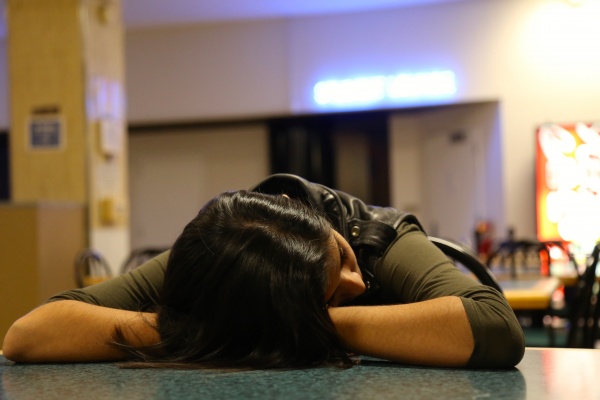Are Students Getting Enough Sleep?
For students who get less than the previously recommended eight hours of sleep per night. (HANA KEININGHAM/ THE OBSERVER)
November 6, 2015
It is a well known fact that college students tend to overlook their need for self-care, in the face of school work and impending deadlines. A recently published study finds that students need, in fact, less hours of sleep than is considered “normal” at the moment.
The study, conducted by the Semel Institute of Neuroscience and Human Behavior at the University of California, Los Angeles, contradicted the current established adequate range of nine to 12 hours of sleep per night. It emphasized the necessity for less sleep, while simultaneously focusing on underlying factors that may result in, or because of, oversleeping.
Dr. Jeffrey Ng, director of Counseling and Psychological Services (CPS) at Fordham, explained why this is the case. “When it comes to how many hours of sleep we need, it’s important to think about it on an individual, case by case basis,” he said. According to Ng, it is important to keep in mind biological differences between individuals. “Some students may be able to function well on the lower end of that range while other students might need to be on the higher end…we’re all built differently,” he said. “The recommendations from the studies provide a range for how many hours of sleep we need to function optimally.”
The study mentions that subjects who slept longer than normal were more inclined to feel depressed and sluggish. Their energy levels registered lower than those who slept just enough. Shannon Connolly, Fordham College at Lincoln Center (FCLC) ‘18, corroborated this. “I usually go to sleep at around 12 and wake up at eight. But some days, I’ll wake up and just lie in bed to try to squeeze in some more rest,” she said. When asked about her energy on such days, she responded, “I have way less energy when I sleep too much, even by an hour.”
Other students echoed her sentiment. Casey Luneva, FCLC ’19, was no exception. “My sleep schedule is all messed up,” she explained, adding “I got more sleep in the summer. I would fall asleep whenever and wake up before 5.” Despite her sporadic sleep schedule, she showed no signs of tiredness or exhaustion.
Mario Bulfamante, FCLC ’19, experiences very different effects when in the same situations. Mario goes to bed and wakes up around the same time as Casey. However, he explained his day very differently. “I usually go through four cups of coffee a day. I drink a couple in the morning, one in the afternoon, with four shots of espresso, and a cup of decaf at night.”
The study goes on to explain that those who don’t sleep within a set, “recommended” range and have high energy levels, as well as those who sleep too much, are classified as “out of the ordinary.” They get enough sleep, or they get little sleep but don’t feel tired. This goes almost completely against the norm, which nowadays, for college students, has become random sleep schedules with extreme fatigue throughout the day. These “extraordinary” cases end up having some way of artificially providing energy. Whether energy drinks, or sleeping pills, students who fall outside of the social norm tend to use some sort of stimulant or depressant to stay awake or fall asleep.
The study, conducted by Dr. Jerome Siegel, professor of psychiatry at UCLA, examines that our hunter-gatherer ancestors got considerably less sleep than we’re told to get. On average, they slept anywhere from 5 to 7 hours a night, with their sleep cycles directly coinciding with temperature. They would fall asleep with falling temperature and wake up when the temperature reached its lowest point – a cycle that took less than 9 hours. However, once awake, these people experienced much higher energy levels than most of us today after anywhere from 10-12 hours of sleep. Dr. Siegel goes on to stipulate that too much sleep might actually be bad for humans.












